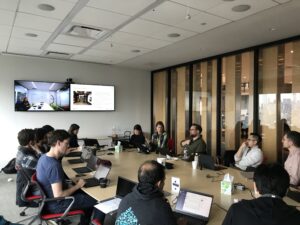Two Sigma has a rich culture of collaboration, underscored by our internal events designed to bring people together. Hack Days are one such opportunity–an entire day designed to bring Two Sigma developers, designers, problem solvers, and system thinkers together to build something new. Starting in 2011 and organized quarterly, internal Hack Days typically occur on a Friday and culminate with a show-and-tell the following Monday. Although the official event is only one day, employees often continue to work on projects on their own time and many of our internal tools and products started off as ideas during one of these events.
At Data Clinic, we believe in bringing people, data, and technology together to affect change and have established a variety of different programming to engage employees to do just that. Starting in 2018, Data Clinic began to participate in Hack Days as a way to immerse employees on social impact topics, learn from nonprofits organizations, and apply social science methodologies. Building on the strong data science and engineering expertise within the company, Data Clinic Hack Day projects provide employees the opportunity to apply their skill sets towards topics beyond their day jobs and contribute towards social impact efforts in the process. Over the last 5 years, we have worked on over 15 projects with 250+ volunteers on Hack Days.
Some of the benefits of social impact-themed Hack Days include:
- Real world exposure to social impact topics: Data Clinic has used Hack Days to facilitate data-driven conversations on issues such as bullying and harassment in public schools, disparities in social and economic mobility, accessibility challenges in transit systems, and making Open Data more accessible. By partnering with mission-driven organizations working in this space, Data Clinic Hack Days have also provided employees the opportunity to engage one-on-one with domain experts and learn first-hand some of the challenges in their work.
- Experience tackling new data & tech challenges: Data Clinic Hack Day participants are exposed to different challenges and methodologies that they then bring back to their teams. Social science data analysis involves different methodological approaches and the need for insightful and interpretable inferences as compared to predictive performance. In addition, developing tools in this space also requires building for users with limited technical capacity and experience with data. These experiences enable employees to be more agile and to apply these techniques and considerations to new applications.
- Opportunities to enhance skill sets: Technical experience is not a prerequisite for participating in a Hack Day and employees often use Hack Days as opportunities to widen their technical skill sets. Prior to any given Hack Day, Data Clinic creates self-guided content and organizes workshops to allow employees across corporate, modeling, and engineering to participate. Because of this cross-discipline approach, engineers can learn to work with data and build models and modelers can work on building out data pipelines.
- Bringing people together for continued collaboration: More often than not, participants continue to work on these projects beyond the Hack Day to fine-tune and release different deliverables including data products (e.g., data pipelines, visualizations, models, etc.) and new features to existing open source tools. Hack Days have also enabled volunteers to work with others within the company that they wouldn’t otherwise have the opportunity to collaborate with.

Past Data Clinic Hack Days have resulted in publicly sharing insights on merging messy school data at the city and state-level, publishing accessibility maps for NYC subway stations, and developing new features and enhancements to Scout, a tool we developed to make open data more discoverable. Last summer, in honor of Juneteenth, we organized a Hack Day with the theme of Equity and Inclusion where we analyzed open data on mortgage applications to understand the factors associated with negative outcomes and higher costs.
We look forward to continuing to develop social impact-themed Hack Days to support a culture of learning and community at Two Sigma.



